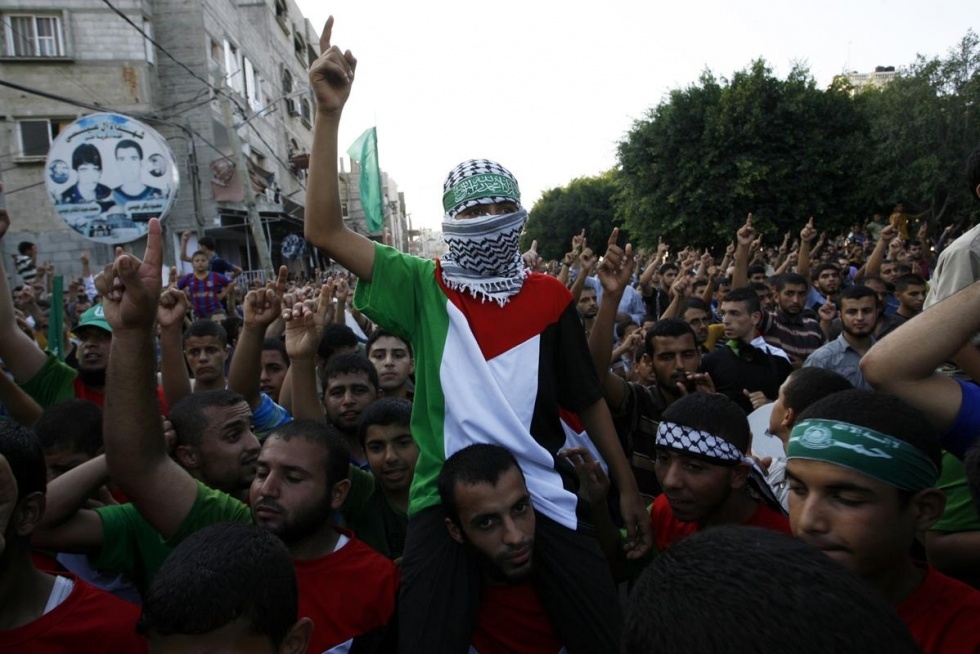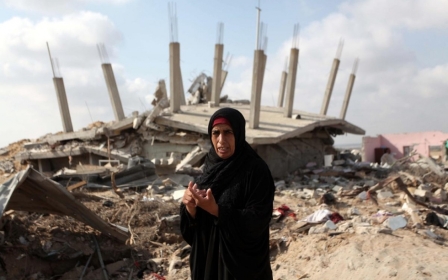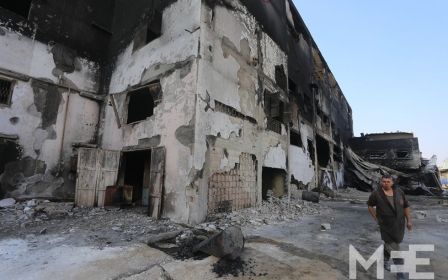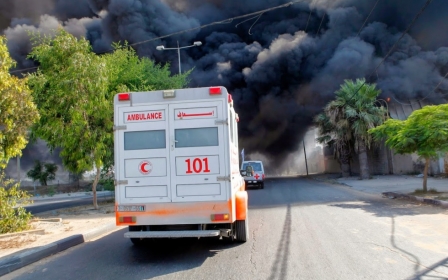Palestinian resistance must combat dynamic of concessions

The Gaza ceasefire and talks in Cairo have dominated discussions concerning Israel's latest massacre in Gaza. Interspersed with additional airstrikes by Israel on the enclave, both the ceasefire and talks have brought to the fore a series of contradictions that are far removed from the 11 clauses proposed by Egypt.
A brief look at the deal reveals a litany of appeasements that serves to diminish Hamas's authority in Gaza while promoting further collaboration between Israel, the Palestinian Authority and the international community, after the last of these, throughout the latest genocidal episode, did nothing but urge Israel to persist in its fabricated defence.
While Hamas has been at the helm in coordinating Palestinian resistance in Gaza, the latest re-emergence of the so-called unity government illustrates the underlying dissonance between repeated assertions of continuing the resistance and the ramifications of relinquishing any vestiges of authority to the compromised political concoction that was so readily embraced by the West.
In the first days following the agreement, declarations of support from several world leaders for the Palestinian unity government had descended all too eagerly into the usual warnings urging cooperation and collaboration, effectively accentuating imperialist reasons for agreement - the reason being the unity government's acquiescence to establishing a hypothetical two-state solution based upon the 1967 borders, thus ensuring no threat to settler-colonialism due to the prevailing hegemonic narrative.
Clause 7 of the Egyptian plan states: "Israel will assist the PA in rebuilding infrastructure destroyed in Gaza, and will assist in providing basic necessities for those Gaza residents who were forced to flee their homes due to the fighting. Israel will provide medical aid to the wounded, and will expedite the transfer of humanitarian aid and food through the crossings."
The following clauses focus upon collaboration between Israel, the PA and the international community in rebuilding Gaza and facilitating the process of reconstruction. The illusion of accountability and responsibility is swiftly shed.
The external projection of what Gaza necessitates is overshadowed by the fact that Palestinians in the enclave remain incarcerated within colonial and imperialist designations in which Hamas, partly due to its acquiescence in the formation of the unity government, has been sidelined.
A recent report by Palestinian Ma'an News Agency confirms the similarities in response to the rebuilding of Gaza. The unity government's deputy prime minister, Ziad Abu Amr, declared, "The Palestinian government will take responsibility for the Gaza strip and its needs."
Without questioning the necessity of rebuilding Gaza, Palestinians are left with no alternative to the indignity of having their lives dictated by entities that have embarked upon a cycle of severe destruction and annihilation, while resistance remains overshadowed by previous compromise.
The current entrusting of collaborators with rebuilding Gaza is another step in consolidating Israel's colonial project under the guise of accountability - a feature that has been regularly evaded and internationally accepted through the auspices of the United Nations.
World Bulletin, on the other hand, has quoted Hamas spokesperson Fawzi Barhoun as stating: "We will not give up the demands of our own people and the resistance will continue with full force."
The same assertion was echoed by Sami Abu Zuhri, another Hamas spokesperson. "There is no going back and the resistance will continue ... there is no retreat from any of our demands."
The statements follow the dynamics of resistance; however it is up to Hamas itself to explicitly declare its allegiances, aims and objectives from within Gaza to encompass its vision of liberated Palestine, something that has been mellowed through the years following the initial revulsion for the Oslo peace accords.
In the years following the subjugation of Palestinians generated by the Oslo accords, Hamas's calls for liberation became ambiguous. While liberation was previously asserted for the entirety of historic Palestine, references to 1967 became more frequent, thus creating a compromise that became more evident in the context of the unity government formation which has expressed agreement with the two-state solution.
The renewed resistance against Israel's Operation Protective Edge had managed to eliminate all references to the compromised two-state travesty, as resistance factions appeared united in their battle against settler-colonial violence.
Considering the magnitude of concessions embedded within Egypt's proposals which Hamas has so far resisted, the question of how resistance is to be cultivated and furthered remains important.
It is easy to be dismissive of the Egyptian proposals by pointing out the similarities between the conditions outlined during this ceasefire and those that brokered the end of Operation Pillar of Defence in 2012. Such a view is detrimental to Palestinians, as it does not take into consideration the heinous intention of furthering subjugation through ostracising Hamas.
Egypt's proposals constitute a repetitive sequence that is constantly paused and reactivated in a manner that, Israel hopes, will gradually accelerate the colonising project without the dynamics involved in usurping other areas of Palestine. In each negotiation following Israeli violence, Palestinians have had to settle for conditions that fail to alleviate suffering, let alone provide a firm political platform for resistance.
The settler-colonial state has generated this situation - every aggression against Gaza ultimately results in Palestinian leaders addressing the urgency of restoration, combined with regurgitated attempts at little, insignificant victories.
However, the political landscape has rapidly changed in Palestine. Hamas has shifted swiftly through a series of phases which now require a firm commitment to resistance, as opposed to navigating the network of diplomatic concessions.
Despite Israeli airstrikes targeting Gaza, "Protective Edge" was perceived as a wider form of aggression against the entire Palestinian population, with varying levels of violence carried out in the enclave and in the West Bank.
As Israel continues to clamour for demilitarisation, while Egypt embarks upon aiding the settler-colonial state to infiltrate Gaza by means of directly involving the international community and the PA, Hamas must have a clear strategy that precludes any form of compromise, in particular with regard to Palestinian liberation.
In the absence of a clear outline, the resistance movement will remain tainted with the disfiguring of Palestinian unity into an ambiguous political exercise.
- Ramona Wadi is an independent researcher, freelance journalist, book reviewer and blogger based in Malta, focusing on the struggle for memory in Palestine and Chile, anti-imperialism, indigenous resistance and the ramifications of settler-colonialism. She is a regular writer for Middle East Monitor and Mint Press News. Her work has been published in various outlets, including academic publications, and translated into several languages
The views expressed in this article belong to the author and do not necessarily reflect the editorial policy of Middle East Eye.
Photo credit: Palestinian supporters of the resistance movement Hamas chant slogans during a march in solidarity with Palestinian resistance in Rafah (AA)
New MEE newsletter: Jerusalem Dispatch
Sign up to get the latest insights and analysis on Israel-Palestine, alongside Turkey Unpacked and other MEE newsletters
Middle East Eye delivers independent and unrivalled coverage and analysis of the Middle East, North Africa and beyond. To learn more about republishing this content and the associated fees, please fill out this form. More about MEE can be found here.





